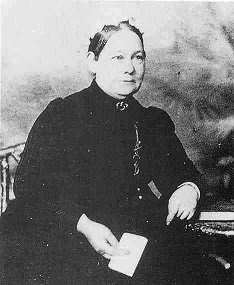Nanny Coincidence April 19, 2012
Author: Beach Combing | in : Contemporary , trackbackWhen Churchill died in 1965 at the age of 90 there was one picture by his bedside. The picture was not of his wife (though their marriage had been a success), nor of his children, nor of his parents. Rather it was of his nanny who had left the earth seventy years before (obit 1895). As in many upper class British and American families of the era Churchill had had only distant, children-should-be-seen-and-not-heard relations with his parents: his American mother he described as being a far-off and rarely glimpsed star. And his true confidante and friend growing up was the governess Mrs Elizabeth Everest who Churchill chose never to forget. He visited her on her death bed (where she worried about his wet clothes), he tended her grave in later life and retained, as we have noted above, at his bedside, a memory of her soothing face.
Much is made of this remarkable lady by modern historians (who like her as an example of upper class child-rearing) and Churchillians: one blog that Beachcombing stumbled upon described her as the Nanny who Saved Western Civilization! In Churchill’s My Early Life he gives her, certainly, full praise. While the young Churchill was, in many ways, a rather dislikeable fellow, discharging pistols into the faces of Sudanese tribesmen and bullying other members of his unit, he did at least remain loyal to this member of the lower orders who had animated his first years.
But there is something else about Mrs Elizabeth Everest that Beachcombing has just discovered and that he can barely make sense of. When EE moved on from the Churchills’ employ she became a nanny to another British family, the Attlees, where she stayed for the two remaining years of her life. The Attlees were an unremarkable upper middle class family with a tradition of serving their country in the law courts. Beach suspects that Mrs Everest was a good deal happier with them than among the sometimes monstrous Churchills. And one of the children she took care of was Clement Attlee then aged ten.
Now Clement would lead the Labour Party in the Second World War, serve ably in the war cabinet and then take over from Churchill after the 1945 general election where Beach shudders to think about what he did. Churchill came up with a whole battery of insults for the rather plain but well-meaning Clement: ‘a sheep in sheep’s clothing’, ‘an empty taxi drew up and Clem Attlee got out’… And they did not have particularly good relations: though they managed to generally remain civil to each other in some very tense situations.
Still one woman nannied two successive British prime ministers! If the Attlees had been part of the aristocracy then the coincidence would be a little bit easier to swallow. After all, there were perhaps a thousand families there, many of whom belonged to the British governing class: it could happen without too many sixes being rolled. But the Attlees were part of the upper middle classes and we are speaking here of tens thousand different families in London alone.
Beachcombing has posted before against ‘coincidences’ in history. But one of this magnitude and importance (the influence of a nanny on a child) brings to mind G.K. Chesterton’s ‘coincidences are spiritual puns’. Any other governing coincidences: drbeachcombing AT yahoo DOT com
In a lyrical write down at the end here Beach wonders, if fortune is an ‘arrant whore’ (Shakespeare) and philosophy a ‘lovely maiden’ (Boethius), whether coincidence is not a nanny, coaxing and aging us.
***
22 April 2012: Mike Dash writes in with this fabulous one! ‘I had not heard the Churhchill/Attlee story. But it put me immediately in mind of the astounding link between Kerensky and Lenin, two successive leaders of Russia (Kerensky as head of the Provisional Government that ruled from February to October 1917 and Lenin as… well, we know what Lenin did). At a time when Russia was a country of 100 million people, both these men were born in the same small town, Simbirsk (now Ulyanovsk) on the Volga, population 36,000. Moreover Kerensky’s father was Lenin’s headmaster, and wrote the famous (perhaps famously wrong) summary of his character, in Lenin’s final school report, that one sees mentioned in every Lenin biography: Quite talented, invariably diligent, prompt and reliable, Ulyanov was first in all his classes, and upon graduation was awarded a gold medal as the most meritorious pupil in achievement, growth and conduct. There is not a single instance on record, either in school or outside of it, of Ulyanov evoking by word or deed any adverse opinion from the authorities or the teachers of the school. More than this: when Lenin’s father died, Kerensky’s father became Lenin’s guardian. And the two families got to know each other well enough for Kerensky and Lenin to have mixed as boys. Hence: in 1914, Kerensky notes in his memoirs, he unexpectedly bumped into Lenin’s sister shortly before the outbreak of war. “Don’t worry,” he remembered telling her – this while Lenin was living in exile in Switzerland, and before the assassination in Sarajevo – “you will soon see him again. There will be a war and it will open to him the road to Russia.” By which point shivers have begun to travel up and down my spine, at least. Thanks Mike!



